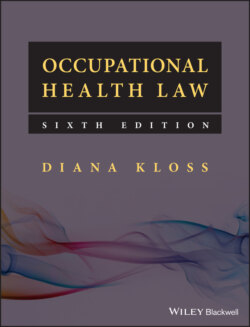Читать книгу Occupational Health Law - Diana Kloss - Страница 16
Criminal and civil law
ОглавлениеThe criminal law is concerned with the punishment of those who offend against society as a whole. Criminal prosecutions are brought by public officials such as the Crown Prosecution Service (Procurator Fiscal in Scotland) and the Health and Safety Executive. The defendant has to bear the costs of his defence, unless he qualifies for public funding. If a defendant is convicted, he will be sentenced to some form of penalty, like a fine, imprisonment or community service. The money paid in fines goes to the courts, not to the victims of crime.
Compensation is a function of the civil law. The claimant (pursuer in Scotland), the individual harmed by an unlawful act, sues in the civil courts or tribunals for damages to make up for what he has suffered. He may also ask for a court order, like an injunction (interdict in Scotland), directing the defendant to return to legality, breach of which will be a contempt of court. The claimant has to finance his own civil action, unless poor enough to qualify for public funding. It is now possible for a solicitor to represent his client on a conditional fee basis, that is that he will waive his fee if he is unsuccessful, but will charge a higher fee if successful in litigation. Conditional Fee Agreements are regulated by the Legal Aid, Sentencing and Punishment of Offenders Act 2012. They must be made in writing and must make clear the amount of the ‘success fee’ expressed in percentage terms which will be payable to the solicitor out of the damages if the claim is successful. In personal injury claims no deduction can be more than 25 per cent of the total damages. The winner of an action in the civil courts will almost always obtain an order that the loser must pay at least some of his costs and these will be paid to the solicitor. Any remaining costs (for example to pay the barrister and expert witness) can be covered by legal expenses insurance. If the case is lost, the claimant will not have to pay his opponent any legal costs unless he has been dishonest or had no reasonable grounds to make the claim. This ‘no‐win, no‐fee’ system has been criticised as encouraging a compensation culture. Television advertisements encourage people to bring claims for accidental injury. Claims handling companies must be registered and from 2019 are regulated by the Financial Conduct Authority.
The separation of punishment and compensation is not absolute. Criminal courts are empowered to order the convicted criminal to pay small amounts of compensation. Victims of violent crime can claim compensation, financed by taxation, from the Criminal Injuries Compensation Authority. Those who flout an injunction granted by a civil court may be jailed for contempt. Also, many incidents give rise to both civil and criminal proceedings. For example, a company fails to provide protection for employees working with asbestos. It is prosecuted, convicted and fined in the criminal court for breach of regulations made under the Health and Safety at Work Act, a criminal statute. One of the employees concerned is diagnosed as suffering from lung cancer and asbestosis. He claims a disablement pension from the Department for Work and Pensions and sues his employer in a civil court for damages for the tort of negligence. The criminal penalty will be paid by the company, but the compensation will be paid by insurance, state‐administered in the case of the pension and privately organised in the case of the award of damages.
